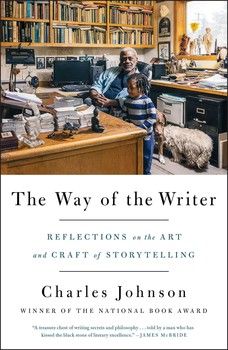Charles Johnson on Writing

You know when a piece is finished, because you can’t pull out a single sentence or change a word or syllable. If you do extract that heavily polished sentence, you create a hole in the space between the sentences before and after it, since you have altered not only the sense but the sound that links those sentences.
— Charles Johnson, The Way of the Writer
Writing in this space has been a long process for me over the years, slowly evolving and changing as I’ve been more influenced by one author or style than another. The topics have changed as I’ve become more curious about other subjects or discovered different facets about a subject I was already keenly interested in. What hasn’t changed too much is the style of my writing. I can read something I wrote ten years ago and know that was me instantly.
On one hand, it’s great that my voice hasn’t changed too much over the years; on the other, I wish I could notice a shift, some improvement. I’ve certainly read enough articles and books through the years about writing, but they must not have resonated enough with me to be translated into my writing. It wasn’t until I started reading The Way of the Writer that I realized why those other books haven’t resulted in better writing for me. The books and articles I was reading were focused more on being a more effective writer, not a better writer.
The Way of the Writer comes with the subtitle of, Reflections on the Art and Craft of Storytelling, and it remains true to it. It’s a book of short essays and stories, full of quotes from other writers that have passed through or influenced Charles Johnson through the years, and anecdotes written in a way that both keep you engaged and teach you how to write better. I’m finding myself fascinated in the techniques he suggests using, from writing super long sentences to experiment with the flow of the words, to writing pieces with a focus on words that start with a select few letters. The highlights I’m making in this book are numerous, and it was a challenge not to highlight the whole book.
The problem, as I see it, with vulgarity is that it is unexpressive, a failure of language to reveal things in a fresh way. Rather than liberate our perception, vulgarity calcifies it.
That phrase I put emphasis on could very well be my mission statement for this space. My aim with writing has always been an attempt to reveal something different about the world from my own perspective, not just share the interesting parts. Tell my story in my own way.
Part of that is by eliminating vulgarity even when extremely frustrated. I share Johnson’s thoughts that vulgarity is not a very creative way to express oneself and I’ve tried to keep it to a minimum over the years.
It does have its uses though. There is a certain power in those words in how they can impact the rhythm of a sentence.
Each sentence is a unit of energy, something we realize when we hear a writer read his or her work out loud, or if an actor performs it. When writing well, one works very hard at creating a musical variety in sentence length, in sentence forms, and throughout a paragraph; at chopping away waste; at harmoniously blending the final sentence of one paragraph with the first sentence of the next through rhythm and rhetorical techniques; at revising until a sentence surprises and is no longer recognizable as its first-draft incarnation.
This final quote captures the essence of this book and how I want to approach my writing moving forward: more revision, and focus on rhythms through a piece. I want to rediscover my voice and improve upon it to find a more definitive form of expressing my stories here. The only way to do that is by writing more, and reading more, to see and practice different structures with sentences and how they play together.
The Way of the Writer is a book I will read through regularly. Its lesson is how to play with words, something that doesn’t occur very often as we race to capture our immediate thoughts in their rawest form to share. It’s a lesson we should all be reminded of and learn again to express ourselves in a more varied way.


Member discussion